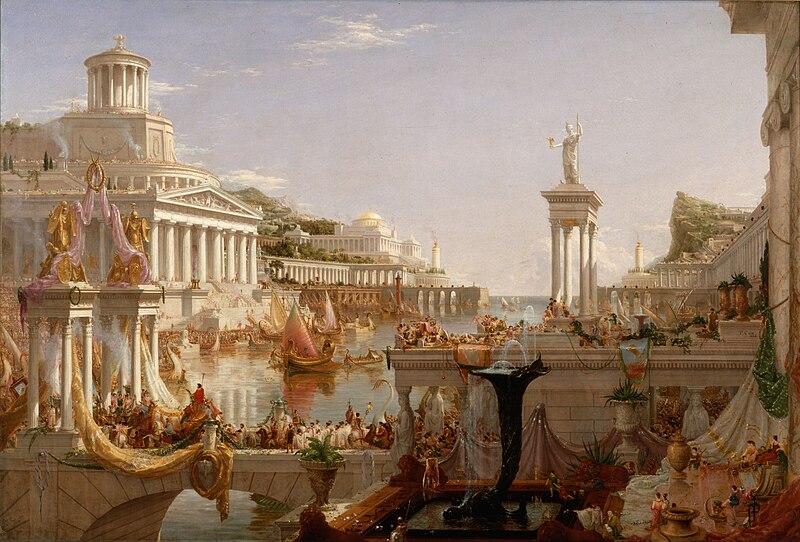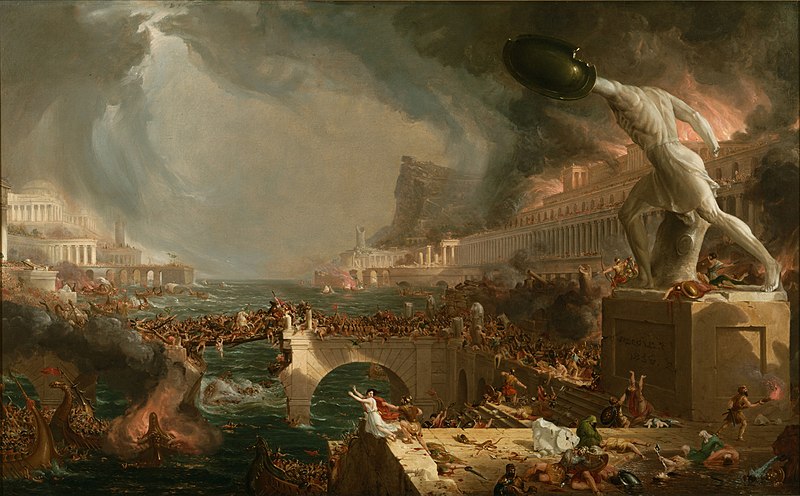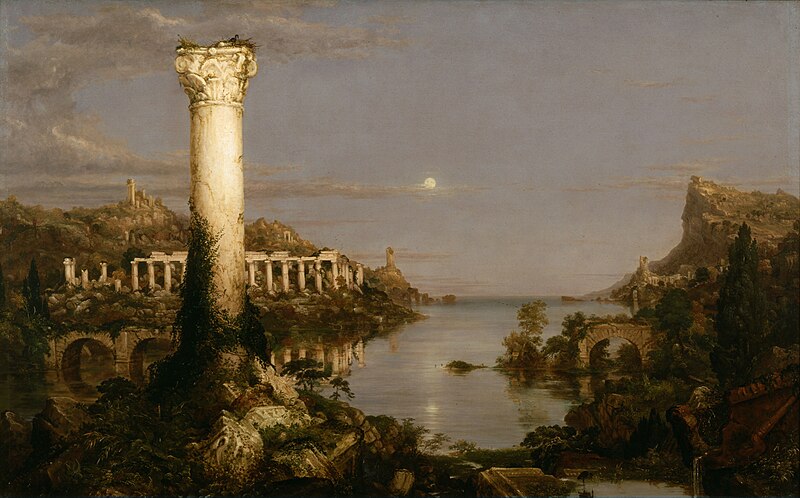In the psychology of the west in the 21st century, two characteristics predominate.
First, this is the age of democracy.
Second, this is the age of narcissism.
And the coexistence of both does not seem to be a coincidence.
As far as I can tell, the actual value of holding regular elections is to flatter the conceit of the individual voters so that they feel important and don't revolt. Look at these powerful people, groveling to you, promising you things! They're in a VFW Hall somewhere in Ohio, eating terrible rubber chicken, nodding and pretending to care about your concerns. Some day they'll be president, but right now they're kissing your @$$. Admittedly, all the voting you did in the past somehow didn't manage to solve your problems, but surely this time will be different.
The slogan for all this nonsense is 'your opinion matters'. This comes in minor variants like 'your voice matters' or 'your vote matters', but the 'opinion' version is the favored generic variant. This is because 'opinion' requires the least possible effort on your part - you don't have to yell, like with a voice, or heaven forbid actually do something like waste an hour on some Tuesday in November. Your thoughts alone are so valuable that the powerful cannot wait to turn to you in order to hear them.
This is an obvious lie, easily identified as such.
The first clue is this exact phrase is frequently used by spam marketers trying to get you to click on online polls. It's almost like they've figured out that people are susceptible to empty flattery about the importance of their political opinions, and use this to infect their computers with malware. Hey, if they'll turn up when the government pulls this nonsense, why not us too? You can hardly blame them for thinking this, not least because they tend to be right.
But more importantly, the idea that your opinion matters violates the poker rule of relative naivete. The old advice in poker was that at every table, there is a mark - a rube or fool who doesn't know how to play the game, and that people will target to make money off. Play a few hands at a table. If after that time you haven't figured out who the mark is, the mark is you, and you should probably leave.
So in the game of politics, do you know who the mark is? Do you know who is being conned in the political process? Doubt not that professional politicians know who they think is being conned. The rich donors know who they think is being conned. The professional political advisers and lobbyists know who they think is being conned. Admittedly, they may not agree with respect to the position of each other - like in any poker game, overconfidence is rife, and most people think they're the best player at the table.
But they also all agree that one of the people clearly being conned is you, John Q. Citizen voter and taxpayer. And be honest - you don't have a clear idea of who is being conned, do you Citizen? Should this concern you? I feel it should.
I do like asking ardent demotists if their voice matters. They usually laugh, knowing the inherent ridiculousness of the question, but are reluctant to explicitly disclaim it.
Not only does your voice not matter individually, your voices barely even matter collectively. The permanent establishment of the civil service, courts, media and universities will continue on their merry way regardless. This is why you can elect Obama and find out, puzzlingly, that eight years later Guantanamo is still open and Americans are still dying in Iraq and Afghanistan. And this is in foreign policy, where the president apparently has the most freedom of action.
But in case the appeal to the importance of your ideas fails, there is a second plank of appeal to the importance of voting - that it is your civic duty. And people who may scorn the first appeal nonetheless seem susceptible to the second. To wit, voting shows how noble and civic-minded you are. Do you love your society? Then waste an hour of your life pressing a button for whichever of the two fools on stage you happen to detest less. Surely you are too responsible to not vote, citizen?
It's narcissism all the way down.
When I started reading more reactionary literature and being convinced by the arguments therein, it was oddly relieving to find out that my opinion does not matter. One no longer needs to feel personally involved or aggrieved by any of the nonsense of the political process. I feel no need to waste any more hours of this short and rapidly passing life worrying about exactly what Donald Trump did or didn't say in the most recent news cycle.
That's for the marks who feel that their vote matters.
This may sound like a call to passivism, that nothing at all matters, but it is not.
Your actions may very well matter. This is particularly true if enough of you act together.
But pressing the button for Kang or Kodos every four years seems unlikely to be one such action.
One pound of inference, no more, no less. No humbug, no cant, but only inference. This task done, and he would go free.
Sunday, January 24, 2016
Friday, January 15, 2016
On the lessons of fall of Rome
To anyone of a vaguely reactionary persuasion, the fall of Rome is a melancholy and tantalising story. The inescapable conclusion, no matter how exactly you explain the fall, is that progress is neither inevitable nor irreversible. Civilisation is fragile, and can be destroyed by a sequence of wrong decisions.
This fact used to be widely appreciated - empires and civilisations were considered to be subject to cycles of rise, power, decay and fall. You can see this, for instance, in Thomas Cole's series of paintings, "The Course of Empire", painted between 1833-1836.

The Savage State

The Arcadian or Pastoral State

The Consummation of Empire

Destruction

Desolation
Of course, we live in an age where Whig history is the only history there is. Americans seem to contemplate the possible end of the glorious American experiment the way most people contemplate death. That is to say, not very often. And when they do, usually only when pressed on the issue, they'll acknowledge that it probably will happen eventually, but then they act as if it is only likely to occur in a very long time.
Then again, that's what the Romans thought too.
Which, to the conservative, makes the matter more alarming. Thinking you're not about to collapse and be overrun is a relatively weak indicator that you aren't, in fact, about to collapse and be overrun.
And in some sense, the modern American position is less forgivable than the Roman one. Today, we have the Romans as an example to consider. When Rome fell, there had not been any comparably long-lived Empire that had ever gotten that far, let alone one that had and had subsequently collapsed.
And while the inevitability of decay is true, the timeline iteslf is not. The other view is the less fatalistic one - try to figure out what exactly Rome did wrong, and try to make sure the same mistake isn't made again, to at least cheat the reaper a little longer. Such as not letting in barbarian hordes in numbers so large that they can sack your capital.
This is true, and a very useful exercise. But it's necessarily quite speculative. Why, exactly, did Rome let in the Goths, and could that have been changed? Harder to say. Would it have fallen anyway at some subsequent point not too long after? Even harder to say.
But there is one lesson that does seem useful, if understudied.
As I've written about before, the major blind spot of many Europeans (pace the Greeks) is that they equate the end of Rome with the end of the Roman Empire. But this was only the end of the Western Roman Empire. The Eastern Roman Empire, in Byzantium, continued on for roughly another thousand years. It may not have advanced to the same heights as the former, but you'd much rather be living there in 483AD than in Rome.
Which seems to suggest that if the collapse is coming, partition and separation may offer a better chance for partial survival.
The attitude of the West on these matters begins to resemble the process that Paul Fussell described pithily, if depressingly, about World War I:
This "slowly dawning and dreadful realisation" usually occurs as a result of two stages of rationalization and one of accurate perception:
1. It can't happen to me. I am too clever / agile / well-trained / good-looking / beloved / tightly laced / etc.
This persuasion gradually erodes into:
2. It can happen to me, and I'd better be more careful. I can avoid the danger by keeping extra alert at all times / watching more prudently the way I take cover or dig in or expose my position by firing my weapon / etc.
This conviction attenuates in turn to the perception that death and injury are matters more of bad luck than lack of skill, making inevitable the third stage of awareness:
3. It is going to happen to me, and only my not being there is going to prevent it.An individual may pack up and move, of course, but a country cannot.
A region can, however, choose to not be part of the same dysfunctional polity that is about to collapse.
Easier said than done, unfortunately. Rome had the virtue of having a Diocletian. America, however, does not.
Subscribe to:
Comments (Atom)